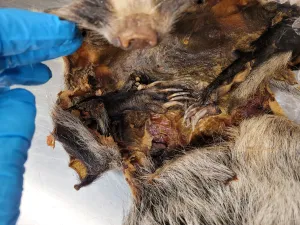MINNEAPOLIS– From October 1, 2022, to September 30, 2023 (FY23), U.S. Customs and Border Protection Agriculture Specialist (CBPAS) at Minneapolis-St. Paul International Airport prevented the possible introduction of livestock diseases and agricultural pests by performing almost 23,000 passenger inspections and intercepting over 14,000 prohibited items.
When passengers are arriving or returning from overseas travel they are asked if they have anything to declare, specifically, pork, beef, or avian products, plants, plant materials, seeds for planting, and fruit. CBPAS are checking for meats and meat products from countries affected with Highly Pathogenic Avian Influenza, African Swine Fever, Classical Swine Fever, Bovine Spongiform Encephalopathy, and Foot and Mouth Disease.
During FY23, CBPAS issued over 150 Emergency Action Notifications for cargo shipments containing prohibited items or pests, requiring their destruction, treatment, or re-exportation, and collected over $245,000 in passenger penalties for importation of undeclared prohibited items.
"Our nation's food supply is constantly at risk to diseases not known to occur in the United States,” said LaFonda D. Sutton-Burke, Director, Field Operations, Chicago Field Office. “These interceptions highlight the vigilance and dedication our CBP Agriculture Specialists demonstrate, daily. They ensure that the United States is safe from harmful diseases that could affect our food supply.”
Agriculture Specialist have intercepted items ranging from handicrafts, grain, and fruits potentially infested with invasive insects to giraffe feces destined to be made into jewelry. Additionally, they also led training for U.S. military personnel at local military bases and performed outreach with airlines and other companies active at MSP to prevent the introduction of pests and diseases through improper handling of International Regulated Garbage
CBP recommends that people who wish to import plant materials, animal materials and other agricultural items consult the CBP Information Center section on the CBP website or call (877) 227-5511. In addition, when traveling to the United States, travelers should always declare all items acquired abroad to CBP officers to avoid civil or criminal penalties and reduce the risk of introducing pests and disease to the United States.
CBP's border security mission is carried out at 328 ports of entry. Please visit CBP Ports of Entry to learn more about how CBP’s Office of Field Operations secures our nation’s borders. Learn more about CBP at www.CBP.gov.


